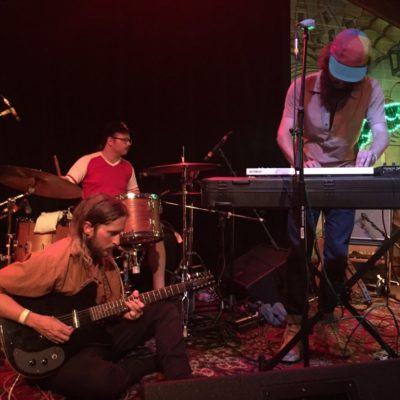
Robin Estrin and Syd the Kid interview Mild High Club’s Alex Brettin at Don Quixote’s International Hall of Music. Read on to see how a review of the show dovetailed into an area woman’s existential crisis, and be sure to tune in to Syd’s show, “No Pasa Nada” on Monday at 10 a.m. to hear our first and only broadcast of the conversation.
https://youtu.be/soUJGnrZuug&rel=0&w=480&h=360
It’s the day before my twenty-third birthday and I’m walking down Walnut Avenue, away from the commercial buzz and tourist-traffic of downtown Santa Cruz. I’ve got Timeline, Mild High Club’s debut album, shimmering through my headphones, and a gentle breeze rubs shoulders with the oak trees lining the street. It’s mid-summer, a beautiful afternoon by anyone’s standards. “I should feel lucky,” I tell myself. “I should want to go to the beach.”
Not everyone loves birthdays. If you were to ask me about my mental state on that day, the day before the big two-three, I might have offered an image for the feeling haunted: “A past lover reincarnated as the smell of late-afternoon sunlight and pine needles.”
Or I might set the scene for the feeling stagnant; surrounded by moving parts: “Standing on the concrete median intersecting Chestnut and Mission, waiting for the light to change. Acquaintances in a car drive by.”
Better yet, I’d spare myself the embarrassment of attempted communication, pass you my earbuds, and play Mild High Club’s “Windowpane;” let Alex Brettin do the talking. The entire track is woozy with the nostalgia that pairs with completing yet another revolution around the sun. A minute in, Brettin riffs on his UV-drenched 12-string and croons, “Life/ passes on the right/ Still life/ takes you for a ride.”
The lyric, to quote again from the band’s oeuvre, “touches me.” It nods to the way I experience time—by fearing that if I don’t aim to constantly account for it, it will escape me altogether. “Windowpane” is a song about trading in fifteen living, breathing sunflowers for an image of them captured in a vase (see: van Gogh). It’s favoring preservation over experience, a sea of iPhone cameras pointed toward a stage. But it also offers some comfort. We are voyeurs of our own lives, yes, but isn’t this photograph gorgeous?
Mild High Club’s sound is sweet as lemonade, but saccharinely so—something like a birthday or a summer in Santa Cruz, a town that’s built entire industries around nostalgia, a yearning for an idealized past. Seriously, think about it: the sepia photos of blond, sandy surfers at your favorite cafe, the historic beach boardwalk, heck, even KZSC’s own Art O’Sullivan, who’s been bringing you the Grateful Dead, regularly, for twenty years. You can’t walk down a single street in Santa Cruz without experiencing déjà vu for some feeling without a name. And this phenomenon is especially potent, for whatever reason, in the summertime. Maybe it’s the tides. Maybe you’ve lived here a few years and know what I’m talking about.
Skiptracing, Mild High Club’s newest record, came out with L.A.’s Stones Throw Records last year. The instrumentation is overtly jazzy, a genre-bending leap from the previous release, but for Brettin, who studied jazz music at Columbia College Chicago, it’s a return to his roots.
“I find myself continually, gradually getting back to jazz, because it’s really the highest form for me musically” he said. “I wouldn’t be surprised if five albums later, if I get to that point, it is just jazz.”
But for now, it’s not just jazz. It’s a fusion, a future nostalgic for the past. Imagine throwing Homeshake’s Peter Sagar and Miles Davis into the dishwasher with your favorite minimalist’s Instagram. Add glitter. What you get is stunningly contemporary and eerily classic. Psych pop meets upscale blues bar. Can you hear it?
Supported by San Francisco’s Healing Potpourri, Mild High Club played to a doting crowd at Don Quixote’s International Music Hall on July 11. The band mesmerized, moving the audience from funky to Zen with professional confidence, skipping the banter and drawing the final notes of one song into the first notes of the next. Wrapping up, the second guitarist, the one who, with long hair and shoeless feet, looked more Felton than L.A., took a seat on the stage and struck the first note of the final song, a cover of Roy Ayers’ “Everybody Loves the Sunshine.” I scanned the room. A dimly lit venue, Don Quixote’s, with its ‘60s era wood moulding and vinyl tabletops—its patrons clad in vintage denim and bartenders old enough to have known Santa Cruz before the earthquake, before the invasion of techies and fancy property developers—was sold this week for 2.2 million dollars.
There was a certain weight to the set, a gravitas. Time slowed and sped up again, and as much as the music beckoned me to presence, I had, tugging at me, the feeling of missing something. I checked my pockets.



